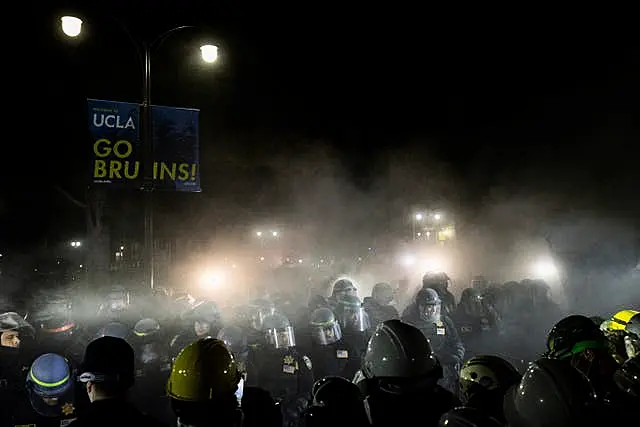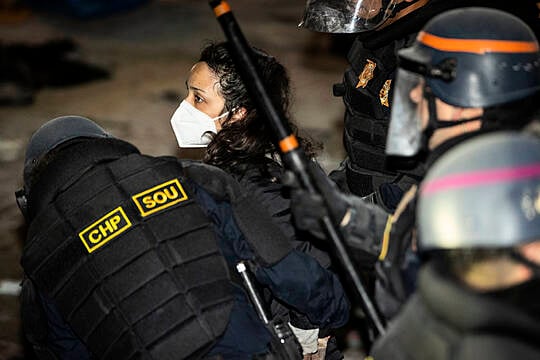Police have removed barricades and begun dismantling pro-Palestinian demonstrators’ fortified encampment at the University of California, Los Angeles (UCLA).
The move came after hundreds of protesters defied orders to leave, some of them forming human chains as police fired flash-bang devices to break up the crowds.
Some people were detained, with their hands bound using zip ties.

The unrest came after officers spent hours threatening arrests over loudspeakers if people did not disperse.
A crowd of more than 1,000 had gathered on campus in support of the demonstration, both inside a barricaded tent encampment and outside it.
Protesters and police shoved each other and scuffled as officers encountered resistance. Video showed police pulling off helmets and goggles worn by some protesters as they were being detained.
With police helicopters hovering, the sound of flash-bangs, which produce a bright light and a loud noise to disorient and stun people, pierced the air.

Protesters chanted: “Where were you last night?” at the officers, in reference to Tuesday night, when counter-protesters attacked the encampment and the UCLA administration and campus police took hours to respond.
Tent encampments of protesters calling on universities to stop doing business with Israel or companies they say support the war in Gaza have spread across campuses across America.
The ensuing police crackdowns echoed actions decades ago against a much larger protest movement protesting against the Vietnam War.
In the Middle East, Iranian state television carried live images of the police action, as did Qatar’s pan-Arab Al Jazeera satellite network. Live images of Los Angeles also played across Israeli television networks, as well.

California Highway Patrol officers poured into the campus by the hundreds early on Thursday morning.
Wearing face shields and protective vests, they stood with their batons protruding out to separate them from demonstrators, who wore helmets and gas masks and chanted: “You want peace. We want justice.”
Police methodically ripped apart the encampment’s barricade of plywood, pallets, metal fences and skips and made an opening towards dozens of tents of demonstrators. Officers also began to pull down canopies and tents.

The number of protesters appeared to diminish through the morning as some voluntarily left with their hands up, while police detained others.
The law enforcement presence and continued warnings contrasted with the scene on Tuesday night, when counter-demonstrators attacked the pro-Palestinian encampment, throwing traffic cones, releasing pepper spray and tearing down barriers.
Fighting continued for several hours before police stepped in, though no arrests were made. At least 15 protesters suffered injuries, and the tepid response by authorities drew criticism from political leaders as well as Muslim students and advocacy groups.

By Wednesday afternoon, a small city sprang up inside the re-enforced encampment, full of hundreds of people and tents on the quad. Demonstrators rebuilt the makeshift barriers around their tents while state and campus police watched.
Some protesters said Muslim prayers as the sun set over the campus, while others chanted “we’re not leaving” or passed out goggles and surgical masks.
They wore helmets and headscarves, and discussed the best ways to handle pepper spray or tear gas as someone sang over a megaphone.
Outside the encampment, a crowd of students, alumni and neighbours gathered on campus steps, joining in pro-Palestinian chants. A group of students holding signs and wearing T-shirts in support of Israel and Jewish people demonstrated nearby.

The crowd grew as the night wore on, with more and more officers pouring onto campus.
UCLA chancellor Gene Block promised a review of Tuesday night’s events after California governor Gavin Newsom denounced the delayed law enforcement response. The head of the University of California system, Michael Drake, ordered an “independent review of the university’s planning, its actions and the response by law enforcement”.
Meanwhile, protest encampments elsewhere were cleared by the police, resulting in arrests, or were closed up voluntarily at schools across the US. In New York state, those included the City College of New York, Fordham University, Stony Brook University and the University of Buffalo.
Others nationwide included Portland State in Oregon, the University of New Hampshire in Durham, Northern Arizona University in Flagstaff, and Tulane University in New Orleans.
Police burst into a building occupied by war protesters at Columbia University on Tuesday night, breaking up a demonstration that had paralysed the school.
At the University of Wisconsin in Madison, a scuffle broke out early on Wednesday after police with shields removed all but one tent and shoved protesters. Four officers were injured. Four people were charged with battering law enforcement.







